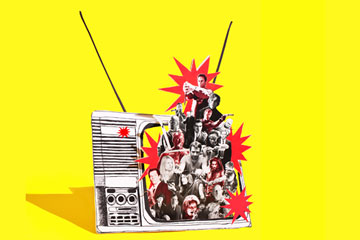
TV drama has been on fire lately. Literally.
On HBO's Boardwalk Empire, hair-trigger sadist Gyp Rosetti registered his displeasure with a small-town sheriff by dousing him in gasoline and tossing a lighter. (The sheriff's offense? Saying "Good luck" in the wrong tone.) A gangster on FX's Sons of Anarchy burned a rival's daughter alive before his eyes. Recently on Fox's The Following, a disciple of an Edgar Allan Poe scholar turned serial killer punished an enemy by pouring gas on him and then--nevermore.
You don't need to smell the barbecued flesh to know which way the wind is blowing. You can follow the trail of limbs to AMC's The Walking Dead, or the strewn corpses to war-torn Westeros in HBO's Game of Thrones, or the screams to Showtime's Homeland, in which a CIA agent put an exclamation point on an interrogation with a switchblade through his subject's palm.
It's not just that there's too much violence on TV, though there probably is. It's not just that the violence is self-parodically extreme, though it definitely is. (On Cinemax's Banshee, the villain hacked off a man's finger and fed it to a dog.) And it's not just that TV is drowning in dumb, mindless violence. It's also drowning in smart, mindful violence. Much of it is used in service of serious themes (misogyny in FX's American Horror Story, morality and mortality in AMC's Breaking Bad). But overall, it's exhausting. Whether on network TV, which is desperate to recobble a mass audience, or on cable, where TV's most ambitious dramas now live, producers have decided that the best way to touch a viewer's heart is to rip it out and show it to him.
Even the most dark-hearted serial probably would not have asked its viewers to imagine what TV news brought us last December from Sandy Hook Elementary School. This is not a Sandy Hook article, at least not in the sense of asking, Does TV make people kill? Before you place Hollywood's prints on a trigger, you have to ask why countries like Britain and Japan, which consume (and make) the same bloody entertainment, have far lower murder rates than the U.S.
But you don't have to be drawing a facile, causal conclusion from Newtown to ask why we sit down for these grim bedtime stories night after night. David Simon, creator of the classic HBO crime show The Wire--whose violence was occasional and unglamorized and whose ratings were accordingly low--wrote about The Walking Dead on his blog after Newtown. It would be "ridiculous" to say the violence on the show inspires real murder, he wrote. But it does send a message: "This isn't mere entertainment, it's national consensus ... a well-executed and starkly visual rendering of the collective fear that governs us."
Two key words here: consensus and fear. Contrary to the idea that the masses want feel-good escapism, the bleakest stuff dominates the mainstream. The Walking Dead gets the highest 18-to-49 ratings of any drama on TV. (Talking Dead, the talk-show-about-the-show that follows it, beat everything on NBC in that demographic one week in February.) The Following had over 15 million viewers its first week. CBS--stodgy, middle-of-the-road CBS--has been the most watched network for years largely thanks to crime shows set in a sick, sad world of predators.
